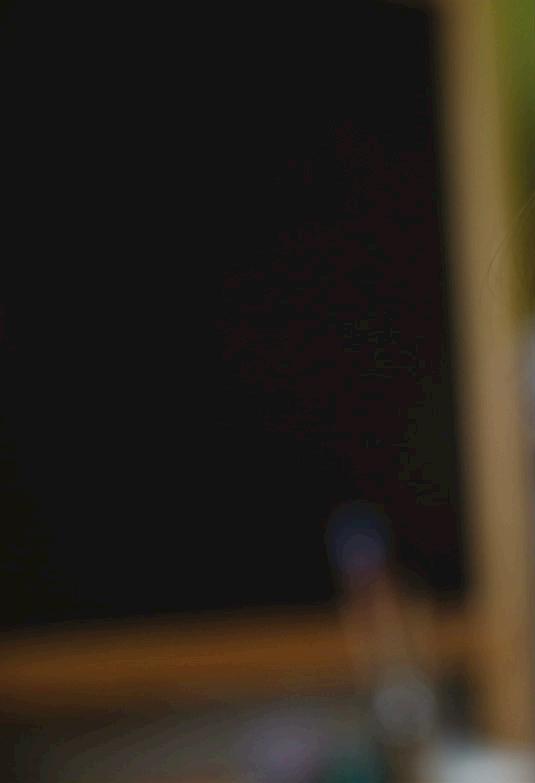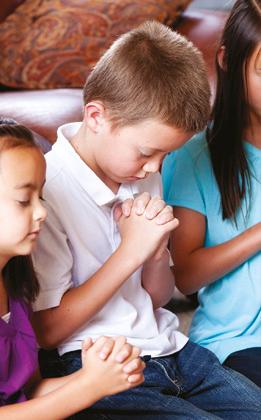
6 minute read
GROWING UP WITH FAITH: CHILD ABUSE OR PRECIOUS GIFT?
GROWING UP WITHFaith: CHILD ABUSE OR PRECIOUS GIFT?
While Richard Dawkins equates teaching children religious beliefs with child abuse, there are positive benefits for children who are taught faith practices.
BY KAREN COLLUM

At the Chipping Norton Literary Festival in Britain in 2013, world-renowned atheist and evolutionary scientist Professor Richard Dawkins declared that raising children with a faith-based identity was “child abuse”. Dawkins is not alone in his beliefs. As a Christian parent, I’ve been on the receiving end of criticism from family and friends about our kids going to church, praying and being taught from the Bible. One went so far as to say I was brainwashing my
children while “she was letting her children choose what faith they had, if any.
The dilemma for parents with deep personal faith is that they wish to pass on their experience of the power of God in their lives and teach their children the same practices and beliefs that have led them to their meaningful relationship with God. The Bible, the collection of holy Christian literature, instructs parents to “train up your child in the way he should go” (Proverbs 22:6). So how do we reconcile Dawkins’ statement with our desire to pass on our faith to our children?
When faced with a dilemma, it’s always helpful to look at the research.
And in this case, the research is quite clear: it depends. what the research says If you spend a few moments googling pros and cons of children being raised to believe in God, you’ll find—not surprisingly—evidence to support both perspectives. But there are a number of peer-reviewed psychological studies that can give us a snapshot of what’s so good about raising children to believe in God and what are the potential problems. Let’s start with the bad Faith without news. substance means a destructive faith parent is more likely Not all faith to perpetrate abuse is helpful or healthy. Just on their children because someone professes faith in God does not automatically correlate with kind, loving, compassionate attitudes or behaviour that will result in positive outcomes for their children. At best, the result is dysfunction; at worst, religion becomes inextricably linked to child abuse. A brief glance at the findings from the Australian Royal Commission into Institutional Responses to Child Sexual Abuse is enough to make one weep for the loss of innocence and damage caused by so-called men
and women of God. But outside the abhorrent and obvious abuses against children, what are some of the other concerns around raising children in faith?
1. FAITH WITHOUT SUBSTANCE
Extrinsic religiosity–that is, religion that is lived outwardly for the purpose of image enhancement as opposed to being an inward, true expression of faith—has been found to be correlated with child abuse. Shallow faith or faith without substance means a parent is more likely to perpetrate abuse on their children. A 2005 study published in the Journal of Psychology and Theology found that it wasn’t the presence of religion itself that correlated with child abuse but the presence of superficial, extrinsic religion.
2.THE UNATTAINABLE GOAL OF PERFECTION
A 2010 study conducted in Australia found another particular area of concern for religious families: religious dysfunctional perfectionism (RDP). RDP occurs when religious expectations and standards are so high that they are impossible to meet. Therefore a person experiences self-loathing and unhealthy shame that inhibits their emotional and mental wellbeing. According to the Journal of Psychology and Theology, parents with rigid, controlling parenting styles who model religious dysfunctional perfectionism tend to pass on that dysfunctional perfectionism to their children.

3. RIGID THINKING
The Psychological Research journal reported in 2019 that non-religious students demonstrated higher levels of flexibility in their thinking than those students from religious upbringings. The researchers suggested that the adherence to rules and regulations associated with religion had a negative impact on a child’s capacity to be flexible in their thinking. However, researchers noted that the same rigidity of thinking may also be demonstrated through other strong ideologies such as political affiliation as well.
benefits of faith
There’s loads of research going back decades that talks about the emotional, social, psychological and, of course, spiritual benefits for children being raised in faith-filled homes, but here are a few interesting points.
1. REDUCTION IN RISK-TAKING BEHAVIOUR
An article published in the American Journal of Epidemiology in 2018 found that adolescents who participate in weekly religious services or made prayer a part of their lives had greater life satisfaction in their 20s, a more positive mood, participated in less drug-related behaviour and had fewer sexual partners over their lifetime. The overall impact of church attendance and faith-based activities was profoundly positive.
Another study in Child Abuse and Neglect from 2008 found that religiosity appeared to improve the psychological wellbeing of children, especially those who had experienced maltreatment. Researchers mentioned that the “inner strength” that comes from religious activities and experiences acts as a buffer against the stressors of life.
2. GO TO CHURCH, LIVE A HAPPIER LIFE
A 2013 American study by Psychology of Religion and Spirituality found that the greater the attendance of adolescents at organised religious events, the greater their life satisfaction. At a stage in life when depression and anxiety begin to rise, keeping our teenagers engaged in church-based activities appears to protect them from engaging in negative behaviours as well as increasing their overall happiness.
3. BETTER SCHOOL GRADES
In addition, academic performance in the final years of high school was found to be higher with those students who identified themselves as religious than those who did not. One explanation for this 2020 study in Applied Economics is that social networks developed when children are raised in a faith community are drivers for academic success.
where to from here?
Knowing some of the potential pitfalls of raising children in faith means that parents can actively prevent those things from occurring, while understanding the benefits can help us nurture our children into adolescence and beyond. Based on the research, here are five suggestions for raising healthy, faith-filled kids:
1. INVEST IN YOUR OWN FAITH Shallow faith that is all show and no substance can be downright destructive to our kids. We have a responsibility to grow our own faith to such a place where it’s deep and meaningful and authentic. Get your own spiritual life on track and you’ll have more chance of passing on a healthy faith to your kids.
2. DON’T BE AFRAID TO ASK QUESTIONS
Consider other points of view, wrestle with the intersection of faith, science and culture and be willing to walk with your children through their questions too. Rigidity of thinking might be an easy option in the moment—the classic “Because I said so”—but it could very well backfire further down the track when the messiness and complexity of life hits our children full force.
3. TAKE YOUR KIDS TO CHURCH AND YOUTH GROUP AND BIBLE STUDY
Go on social outings with your church family. If you don’t have a church family, find one! The more positive social connections you can make for you and your kids, the better.
4. PRAY FOR YOUR CHILDREN
Do whatever you can to maintain a relationship with them, even if they decide their beliefs don’t exactly line up with yours. Remember, God loves your kids even more than you do. Trust that He’s got them in the palm of His hand.
Jesus had a special place in His heart for children. One of the most precious gifts we can give our kids is to pass on a healthy, functional faith. By being intentional in the way in which we raise our children, being willing to engage in self-examination of our own faith, maintaining positive relationships with our children and honouring their individual faith journeys, religious families can confidently face any criticism from family and friends.
Even Richard Dawkins himself.
Karen Collum is an Australian children's author, chaplain and theology student. She lives on the Gold Coast, Queensland.




